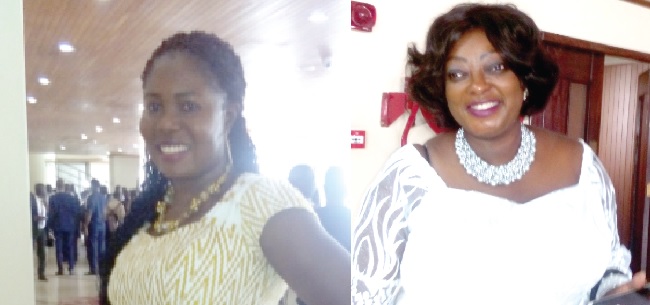
Increase in female MPs generates mixed reactions
Some female Members of Parliament (MPs) in the Sixth Parliament of the Fourth Republic have reacted differently to the increase in the number of female representatives in the House.
Advertisement
While some are of the view that the increase in the number is a good indication for business in the House, others are of the opinion that there is the need for women to constitute at least 40 per cent of the 275-member House, before they can make any meaningful impact on legislation.
The Ranking Member of the Committee on Women and Children, Mrs Gifty Eugenia Kusi, MP for Tarkwa-Nsuaem in the Western Region, in an interview after the last State of the Nation Address by President John Dramani Mahama yesterday, said the increase in the number of women for the Seventh Parliament which would be sworn in on the eve of January 7, 2017, was “phenomenal.”
According to her, the electorate were becoming more sensitive to female representation and the current number from 31 to 37 was encouraging
To her, what was more important was that many of the committees in the House did not have female representation so an increase in the number of women would ensure that each committee, at least, would have a female representative.
She also called on female parliamentarians to be more vibrant and ensure that they take an active part in the deliberations of the House.
Mrs Kusi, who did not contest in the December 2016 parliamentary election, advised new female entrants who were yet to be sworn in to be assertive and forthcoming on issues in the House.
For her part, the outgoing MP for Gomoa Central, Ms Rachel Florence Appoh, said before the impact of women could be felt in Parliament, there was the need for the numbers to increase to, at least, 40 per cent of the membership of the House.
According to her, women are seriously out-numbered in the House, a situation that makes it difficult for their voices to be heard.
“Women in the House only get the chance to dominate in deliberations only when it is International Women’s Day.
“Other than that, the Speaker cannot call all women to give their views on issues but, at least, what I have observed is that every woman who raises her hand to speak is given the opportunity,” she said.
According to her, there were some bills such as the Property Rights of Spouses Bill which, without majority of women participation in Parliament, would be very difficult to pass into law.

Rachel Appoh - Out and Freda Prempeh - In
Appoint more women
The MP for Tano North, Ms Freda Prempeh, who is coming back to the House for her second term, also said although the numbers had appreciated, there was still more room for improvement.
She said issues on women were lagging behind in the House because there was low female representation, a situation which needed to be tackled sooner than later as such numbers could not be used in passing gender- sensitive bills.
She said it was time their male counterparts realised that gender was not just about women, but also about men, adding that for now the increase in the number would not help in the proceedings in the House.
Ms Prempeh said there was the need for the incoming President to give more women the opportunity to serve the country.
The Deputy Ranking Member of the Committee on Women and Children, Ms Grace Addo, outgoing MP for Manso Nkwanta in the Ashanti Region, in her submission also said the increase in the number of women in the Seventh Parliament was not proportionate to the male counterparts in the House.
The MP said due to the low representation of women in the House, the Affirmative Action Bill, which in her view should have been given the needed attention, was not passed into law.
She advocated the need for political parties to take up the issue of increase in the number of women in Parliament, saying that they should dedicate some safe seats to women to boost female representation in the House.
She said it was only through an affirmative action on the part of political parties that the number of women in Parliament could increase appreciably.
According to her, women faced a lot of hindrances in their bid to seek political offices.
She added that although many women would want to go into politics, they were always discouraged from doing so due to lack of finance.
Women in 7th Parliament
A total of 37 women have been elected to the seventh Parliament during the December 7, 2016 general election.
They comprise 24 women elected on the ticket of the New Patriotic Party (NPP) and 13 on the ticket of the National Democratic Congress (NDC).
For the NPP, 12 female MPs are entering Parliament for the first time, with two making ‘a comeback’, while 10 retained their seats; but the NDC has seven new entrants and six re-elected.
The regional breakdown of the female parliamentarians for the Seventh Parliament is as follows: Greater Accra has the highest number of 10, with six on the ticket of the NPP and four on the ticket of the NDC; followed by the Central Region, with six female MPs-elect, five on the ticket of the NPP and one from the NDC.
The Ashanti and Eastern regions each has five female MPs-elect. All the MPs-elect in the Ashanti Region are representing the NPP, while in the Eastern Region, four were elected on the ticket of the NPP and one from the NDC.
The Volta Region has five women, all elected on the ticket of the NDC.
The Brong Ahafo and Western regions each has two female MPs elected.
The Upper East and Northern regions also have one female MP each, while the Upper West has no female MP.



